‘A climate of fear’: Hong Kong media company behind shuttered Apple Daily admits defeat

Bystanders outside the headquarters of the Apple Daily newspaper and its publisher Next Digital Ltd. in Hong Kong
By Michelle Toh, Sasha Chua and Chandler Thornton, CNN Business
The media company behind the now-shuttered Hong Kong tabloid Apple Daily is shutting down after its entire board resigned, citing “a climate of fear” over the city’s controversial national security law.
Next Digital, which was founded by now-imprisoned tycoon Jimmy Lai, said in a stock exchange filing Sunday that its remaining four directors would step down, to best “protect shareholders, creditors, employees and former employees.” The directors are Chairman Ip Yut Kin, Louis Gordon Crovitz, Mark Lambert Clifford and Lam Chung Yan.
It also said it was seeking a liquidation of the company’s assets, but hoped Apple Daily may live on in Taiwan, where it still has an online edition, under new owners.
The company noted that Next Digital’s shares had already been suspended from trading in June. That’s when top Apple Daily executives and editors were arrested in Hong Kong for allegedly violating the national security law. The law bans any activity Beijing deems to constitute sedition, secession and subversion, and allows Chinese state security to operate in the territory.
That same month, almost exactly a year after the law’s introduction, Next Digital’s flagship tabloid was forced to shut down.
A dramatic police raid on the Apple Daily newsroom, a government notice served on its headquarters and the seizing of the paper’s bank accounts stoked concerns about press freedom and property rights.
“The Hong Kong government has never indicated which articles published by Apple Daily allegedly violated the national security law,” Next Digital said in its statement Sunday.
“This uncertainty created a climate of fear, resulting in many resignations among the remaining staff at the company in Hong Kong, including those responsible for the regulatory compliance duties of a publicly traded company.”
The company is now requesting that the trading of its shares “remain suspended until further notice,” while also calling for a liquidation of its assets to pay off shareholders, creditors and employees.
Previously, in June, the firm’s board had appealed to Hong Kong authorities to unfreeze assets in order to pay employees, according to Apple Daily.
The company is hoping that some of its legacy can still live on.
It called on liquidators to consider deals “that would generate funds to benefit creditors,” noting that previously “several parties have expressed interest in acquiring the operations of Apple Daily in Taiwan.”
“There is also value in assets such as the unique intellectual property created since Apple Daily was founded,” Next Digital said.
The Hong Kong government hit back at the company’s directors Monday, accusing them of “smearing the Hong Kong national security law.”
In a statement, the city’s Security Bureau said that police arrests of Next Digital personnel were “based on evidence strictly according to the law.”
“The prosecution case … has already been stipulated clearly in the allegations submitted by the prosecution to the court in writing during the legal proceedings and supplied to the defendants,” it added.
The bureau also dismissed the notion that Next Digital was “forced into liquidation due to a lack of funds.”
It said that while authorities froze about 18 million Hong Kong dollars ($2.3 million) of the company’s assets, it should have been able to carry on operations because it reported having working capital of about 520 million Hong Kong dollars ($66.9 million) in March.
Apple Daily was created by Lai, a former textile tycoon, in 1995, and quickly rose to prominence for its criticism of the ruling Communist Party in mainland China. It later became the last major voice in media for Hong Kong’s pro-democracy camp, dividing public opinion in the city.
“As Apple Daily often observed, Hong Kong people have a collective memory of what life was like elsewhere when freedom of speech was denied: No other rights are safe,” the Next Digital directors wrote Sunday.
— Carly Walsh and Eric Cheung contributed to this report.
The-CNN-Wire
™ & © 2021 Cable News Network, Inc., a WarnerMedia Company. All rights reserved.